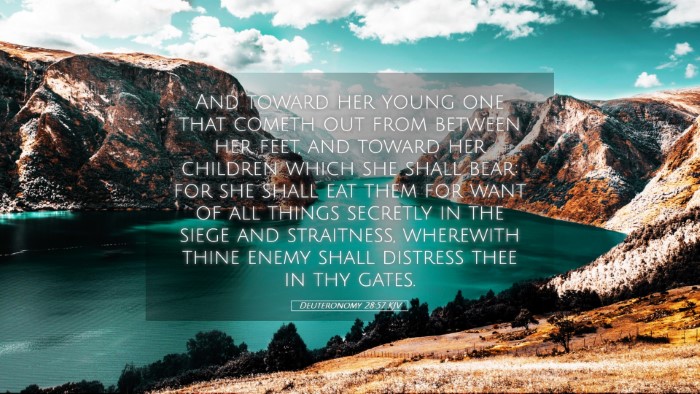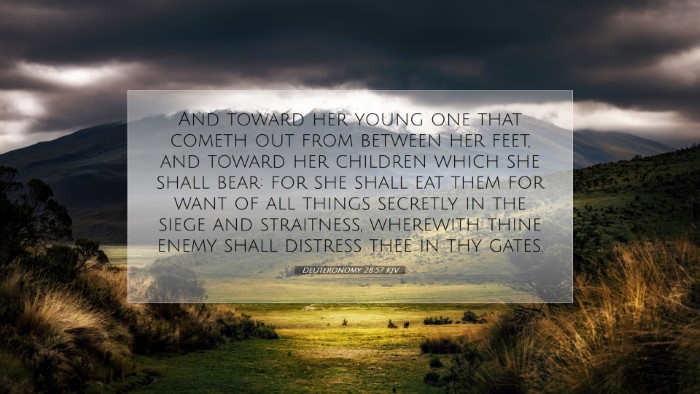Deuteronomy 28:57 Commentary
Verse: "And toward her young one that cometh out from between her feet, and toward her children which she shall bear: for she shall eat them for want of all things secretly in the siege and straightness, wherewith thine enemy shall distress thee in thy gates." (Deuteronomy 28:57, KJV)
Introduction
This verse resides within a larger context of the blessings and curses outlined in Deuteronomy 28. The chapter serves as a stark contrast between the consequences of obedience and the resultant blessings as opposed to the dire consequences of disobedience and curses. This particular verse highlights the extreme conditions that may arise from God’s judgment, particularly referring to the anguish of siege and famine, leading to unimaginable acts of desperation.
Exegesis of the Verse
Contextual Background: In Deuteronomy 28, Moses conveys to the Israelites the outcomes of their adherence or rebellion against God’s commandments. Commencing with blessings (verses 1-14) and leading to curses (verses 15-68), the text depicts vivid repercussions that would ensue should the Israelites forsake God. The language used throughout portrays a grim reality to denote profound suffering.
Insights from Public Domain Commentaries
Matthew Henry's Commentary
Matthew Henry notes the outrageous nature of these curses as a reflection of the dire circumstances that could befall a disobedient people. He emphasizes the desperation in the siege, where, amid hunger, cannibalism arises as a horrific form of sustenance. He explains that the “woman is represented as so distressed that she will resort to the ultimate degradation, consuming her children.” This, according to Henry, is not only a literal interpretation of the scripture but also a metaphor for the consequences of turning away from God. He highlights that thus, the consuming of one’s children illustrates the complete breakdown of societal norms and values, showcasing the depth of sin's progression.
Albert Barnes' Notes on the Bible
Albert Barnes reflects on the intensity and graphic nature of this particular curse as a warning of the dire consequences that accompany the rejection of divine law. He remarks upon the phrase “she shall eat them,” illustrating the level of famine that will grip the people. Barnes discusses the historical precedents where such acts of desperation were recorded, stating that severe sieges in ancient times often led to cannibalism, most notably in the accounts within the siege of Jerusalem. His commentary serves as a reminder that God’s warns His people about the seriousness of His covenant, inviting them to heed the consequences of their choices not just spiritually, but as a community.
Adam Clarke's Commentary
Adam Clarke offers a reflective insight into this verse by noting the moral and ethical implications of such desperate actions. He emphasizes that such occurrences emerge due to a prolonged state of tribulation and siege, where even maternal instincts are obliterated by necessity. Clarke explains that “the most touching and affectionate of all relations will be disregarded; the mother will turn against her child as a means of survival.” Clarke positions this verse within a broader theological framework, emphasizing God's deep disappointment in His people should they stray from Him, leading to such inhumane responses in times of trial.
Theological Implications
This verse, while placed within a historical context, invites a deep theological reflection upon the relationship between divine obedience and the resulting social order. The warnings articulated serve not merely as historical recollections but resonate with modern implications too. As a community, turning away from the divine can lead to societal breakdowns, manifesting in violence, selfishness, and moral decline. The imagery in Deuteronomy 28:57 compels pastors and theologians to grapple with the reality of sin and the impact of distancing from God in pursuit of worldly desires.
Practical Applications
In light of this commentary, there are several vital applications for congregational teaching and personal reflection:
- Understanding Consequences: Encourage deeper understanding of the ramifications of societal sin, both individually and collectively, reminding individuals of the historical context where disobedience led to severe consequences.
- While this passage unveils a shocking reality, it invites the community to cultivate empathy for those suffering extreme conditions and to draw them towards a God-centered life.
- Strengthening Faith: The narrative encourages believers to remain grounded in faith, focusing on God’s provisions and goodness, even amid trials.
- Community Awareness: Lead discussions on the health of one’s community and the steps necessary to uphold moral values in contrast to the risks of societal descension.
Conclusion
Deuteronomy 28:57 starkly warns of the despair that accompanies the rejection of God's commandments. Through the insights from Matthew Henry, Albert Barnes, and Adam Clarke, we see a comprehensive view of the profound implications that arise from disobedience, urging contemporary believers to reflect on these teachings. The narrative serves as a timeless reminder of the importance of adherence to divine law and the need for communal accountability to prevent societal decay.


